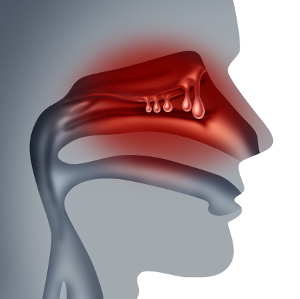Patients with nasal polyps have less zinc in the diseased tissue
 Nasal polyps are local growths that may cause runny nose, breathing difficulty, reduced sense of smell, and other symptoms. The polyps are a result of chronic inflammation that can have its roots in a number of causes. According to a new study that is published in Clinical Epidemiology and Global Health, patients with nasal polyps have lower levels of zinc in the affected tissue. Zinc is important for our immune system and for regulating inflammatory processes. Therefore, the nutrient may even have therapeutic potential because many people have relapses after their treatment. Earlier studies even suggest that patients with nasal polyps lack selenium, which is why one should also pay attention to underlying causes like respiratory allergies and food intolerance.
Nasal polyps are local growths that may cause runny nose, breathing difficulty, reduced sense of smell, and other symptoms. The polyps are a result of chronic inflammation that can have its roots in a number of causes. According to a new study that is published in Clinical Epidemiology and Global Health, patients with nasal polyps have lower levels of zinc in the affected tissue. Zinc is important for our immune system and for regulating inflammatory processes. Therefore, the nutrient may even have therapeutic potential because many people have relapses after their treatment. Earlier studies even suggest that patients with nasal polyps lack selenium, which is why one should also pay attention to underlying causes like respiratory allergies and food intolerance.
Nasal polyps are small clusters of cells that form inside your nasal passages or in the sinuses. They are often teardrop-shaped, liquid-containing, and hang from a slender stalk. The polyps occur as a result of local inflammation and the condition may be caused by:
- Chronic sinus infections or colds
- Allergies towards airborne allergens such as pollen and mold
- Allergies towards dairy products and other foods
- Allergies towards acetylsalicylic acid
- Asthma that may be caused by allergy
There is often a link between chronic allergy/hypersensitivity, chronic inflammation, and local irritation. Small nasal polyps often give you a runny nose and a feeling of having a permanently stuffy nose that cannot be cleared. Larger nasal polyps cause breathing difficulty, and some people experience headaches and facial pain. Moreover, nasal polyps can result in impaired sense of smell and, as a derived effect, impaired sense of taste.
Nasal polyps are treated medically with corticosteroids that counteract inflammation, and surgery may even be required in some cases. However, even with proper therapy, polyps tend to recur because the underlying problem is not properly addressed. In the case of allergies or food intolerance that are not detected with a regular blood test, one should avoid altogether or limit one’s exposure to the things that cause the problem. It is also important to look at potential nutrient deficiencies.
Zinc and selenium and their effect on mucosa and inflammatory processes
Earlier studies have shown that patients suffering from nasal polyps have lower levels of selenium, zinc, and the zinc-containing SOD antioxidant (superoxide dismutase) in their polyp tissue compared with healthy controls.
Here, the scientists refer to the fact that zinc is involved in a host of different enzyme processes that are of importance to our mucous membranes, immune defense, and inflammatory reactions. The same goes for selenium that is also a part of the GPX antioxidant (glutathione peroxidase). The new study was conducted at the Imam Khomeini Hospital of Ahvaz in Iran between July 2018 and June 2019. The researchers measured levels of selenium and zinc in polyp tissue taken from 92 patients (47 men and 25 women) and compared them to levels in nasal mucosa tissue taken from healthy controls.
They found that zinc levels in nasal polyp tissue were significantly lower than levels in healthy nasal mucosa tissue. As for selenium, there was no significant difference but this may be down to the way the study was designed. The researchers therefore call for additional studies.
References
Soheila Nikakhlagh et al. Comparison of tissue level of selenium and zinc in patients with nasal polyposis and healthy people. Clinical Epidemiology and Global Health. 2021
Claudia Lill et al. Milk allergy is frequent in patients with chronic sinusitis and nasal polyposis. Am J Rhinol Allergy. 2011
Næsepolypper (netdoktor.dk)
Search for more information...
- Created on .








